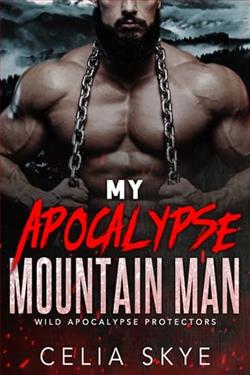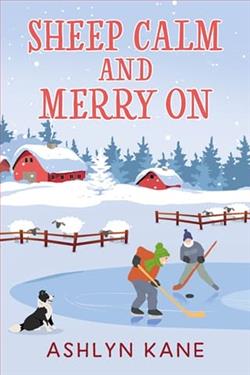Page 2 of Heart of Winter
He nodded acknowledgment and went to find Tessa.
His cousin, only sixteen, stood at the rail near the bow, staring out across the frosted ice of the North Sea, her hands clenched tight together, the breeze blowing her auburn hair out behind her like silken banners.
He paused a moment, to feel regret for her. Regret that she was young, and beautiful, and highborn, and about to marry for a military alliance.
He moved to settle beside her, forearms braced on the rail. “Doing all right?”
She gathered a breath, first, before she blinked and turned to him, and scraped up a smile. “Yes. I’m fine.” Her chin trembled, and her eyes were red-rimmed, but she held herself up bravely.
For all that his cousin John had loved him and made him feel like a welcome addition to the family, Oliver had always felt, in some ways, closer to the girls. Trueborn though they were, they lived and prospered at the discretion of their trueborn male relations. Her father and brother were dead, but Tessa couldn’t stay to comfort her mother; couldn’t take possession of Drakewell as its lady. Instead, she was being dragged across the kingdom to marry a king with a forbidding reputation, and a ferocious army at his back. At sixteen, she should have been mooning over soft lordlings who’d written her poems and offered her posies, not offering her trembling hand to a warlord more than twice her age.
It was monstrously unfair.
So were most things, in Oliver’s experience.
He reached to pluck the hood of her new fur-lined cloak up over her head, covering her wind-chapped ears, and smiled back, feeling sure his own smile was as wobbly as hers. “It won’t be much longer now,” he said, for whatever consolation that was worth. “And the palace at Aeres is said to be impossibly warm. They have great fireplaces, and underground hot springs. The kitchens and storerooms are built into natural caves that – what?”
She laughed, a sad, bubbling thing, but he was glad to hear it – the first time she’d laughed since they set out from home. “You’ve been researching again, haven’t you?” she asked.
“Again?” he huffed. “As if I ever stopped.”
She laughed again, and shook her head – though it didn’t come across as cruel. Oliver’s father – it was hard to think of him as anything but Alfred;fatherhad so rarely crossed Oliver’s lips – had despaired of his only son’s bookishness. “You can’t inherit, but you could at least make a name for yourself on the battlefield!” But Oliver had loved books more than swords. His mother hadn’t been literate, what little of her he remembered, but she’d loved stories; would spin him yarns while she worked, as he sat on the floor at her feet, hanging in raptures from her every word. She’d done voices for all the characters, and pantomimed the more frightening bits. Oliver loved hearing and reading about brave derring-dos…but participating had always turned him clammy and sick (often literally).
“I wanted to know what to expect of our new home,” he said.
She glanced out across the water. “You mean my new home. You’ll be going home to help Mother, once I’m settled.” Her voice shivered in a way that he knew had nothing to do with the cold.
“Tessa–”
“It’s fine. I’m fine.” She offered another smile, this one tight and strained. “I know my duty, and I shall do it gladly.”
He stepped closer, so that their shoulders were pressed together, and together they watched the ice floes slip past.
~*~
For all her strengths, Lady Katherine did not have the most…subtle way with the written word. She had signed her name with a flourish at the bottom of the page, and pressed her signet ring to the wax seal, but it was Oliver who’d written to King Erik of Aeretoll. He’d approached the correspondence with delicacy, and tact, sure to begin with great praise for Aeretoll and its reputation. He’d spoken then in – perhaps too lavish – detail about Drakewell; about its people, and its farms, its trade, its agricultural bounty. Drakewell was a duchy of fields, and fells; of rolling hills, and bumper crops; of sleek horses, and fat pigs, and cows that came lowing every evening, bells chiming across the pastures, audible on a clear spring night even from the ramparts of Drake Hold. He wrote about the ducks, just a little, because he had to; the constant Vs flapping noisily overhead, off for a fresh pond that gleamed like glass.
Perhaps, if he could write the letter again, he would tone it down a bit.
But. From the pastoral beauty of Drakewell, he’d moved on to talk gently of an old alliance, a meeting long past, between his own grandfather and King Erik’s father. And then, years later, between a young King Erik and Oliver’s Uncle William. No treaties had been signed, but an understanding had been reached, hands clasped in friendship over a brazier in a tent, while snow fell in silent profusion outside. He spoke of the war that was on now, the uncertain stalemate. Of advantages, opportunities for trade.
Spoke lastly of his cousin Tessa’s gentle nature and rosy beauty. Of her readiness and willingness to pledge herself to a strong husband.
It took up three pages, all told.
The reply, which had come several weeks later, had said only:
Come and bring the girl. We shall talk.
Oliver had no idea what sort of welcome awaited them, as the barge pushed into the crowded harbor, and drew slowly in to dock.
Despite the hard chill and the ice on the water, the snow on the banks turned to sticky mud along the footpaths, the harbor bustled. Sailors called to dockhands; great booms lowered nets full of crates down onto ice-slick boards. In the cacophony, Oliver caught bits of song, angry curses, friendly ribbing, and hearty laughter. He recognized flags and sail shapes from all over the South, even, he noted with a lurch, the star-emblazoned banners of the King of Aquitania,hisking, technically. One with no heir, and losing ground in every way that mattered to the Sels from the west.
The air smelled of frost, and fish, and the deep breaths he took of it did nothing to quell his nerves.
Tessa wasn’t doing much better, he didn’t think, judging by her wan complexion and the way she held a gloved hand to her throat, as if she was choking.
The bargemen threw out ropes. “This is where you get off, your lordship,” one of them called.















